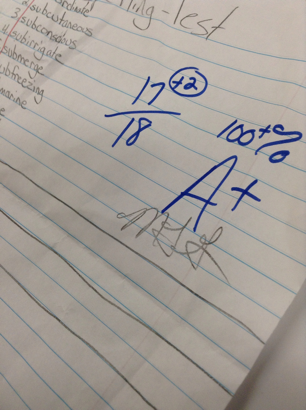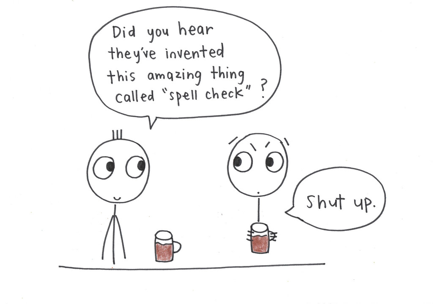Spelling seems to be the buzz word in the air as we move into Spring, it seems everywhere I turn both professionally and personally I am having discussions about spelling in education. With my daughter (in preschool) coming home with an activity she did with her name spelled wrong, to a discussion with a colleague, I can not escape the world of spelling!!
 When I first started my career as a first grade teacher I “rocked the boat” several times. My colleague and teammate in a 2 section elementary school had been teaching first grade for over 20 years, at this point we met weekly to share ideas and resources, which she had countless that I greatly appreciated; however, we did not see eye to eye on every topic…I will never forget the day when she approached me about Friday spelling tests! It was mid-winter, about 20 minutes after dismissal, I was busy resetting my classroom for the next day but secretly hoping for a snow day! She came in and stated that she heard a rumor I had stopped doing Friday spelling tests.
When I first started my career as a first grade teacher I “rocked the boat” several times. My colleague and teammate in a 2 section elementary school had been teaching first grade for over 20 years, at this point we met weekly to share ideas and resources, which she had countless that I greatly appreciated; however, we did not see eye to eye on every topic…I will never forget the day when she approached me about Friday spelling tests! It was mid-winter, about 20 minutes after dismissal, I was busy resetting my classroom for the next day but secretly hoping for a snow day! She came in and stated that she heard a rumor I had stopped doing Friday spelling tests.  I explained to her that I had stopped right after parent teacher conferences. I had found that my students were memorizing the words just for the test, there was no carryover into their daily writing so I felt it was not benefiting my students or a good use of my time – you would have thought I was committing blasphemy!!
I explained to her that I had stopped right after parent teacher conferences. I had found that my students were memorizing the words just for the test, there was no carryover into their daily writing so I felt it was not benefiting my students or a good use of my time – you would have thought I was committing blasphemy!!
I believe that everything we do in education needs to have a purpose, we have very little time with students and way too many mandates and expectations on our plate. I was giving a formal spelling test each week because my colleague was, I thought I had to, it was what I did when I was in school. But I needed to unlearn the ways of the past and do differently than my teachers had done for me, clearly it didn’t work….I was (and am) a horrible speller! So, I sat down and did my research there were many ways to teach spelling without the formal Friday spelling test:
- I put a HUGE emphasis on our word study! During our word study we talked about word recognition, phonics, spelling patterns, and vocabulary. This was key, now my students were investigating words and make connections to other words/patterns and helped improve their reading!! We made a word study notebook that students went back to when they needed to reference a word -it was their individual dictionary!
- We focused more on our sight words. I made high-frequency words of high importance. We celebrated them at every opportunity we could….it was just like how Pee-Wee celebrated a word of the day!
- I celebrated and encouraged developmental spelling. Sometimes students misspellings gave me more insight into their word attack and phonetic abilities than accurate spellings did – plus developmental spelling is SO FUN to read 🙂
- We were reading and writing all the time!! I truly believe if you are reading everything your students are writing they aren’t writing enough! It is true, practice makes perfect…I had to give my students more time to practice writing and reading so I restructure my daily schedule.
- Finally, I gave a spelling inventory every other month. The data from these assessments drove the focus of my spelling patterns. These inventories are NOT spelling tests, this is where I can see their developmental spelling as well as how they are applying what patterns we have gone over, students do not preview the words, this is not a pre assessment it is a quick snapshot of how they are doing with their word attack skills.
 It seems too easy doesn’t it? I believe in education we often over complicate tasks. It can be difficult to unlearn and get parent support when we move away from the way they were taught in school. But society is not what it was when the parents of our students were in school so why should we still be teaching as if it were?
It seems too easy doesn’t it? I believe in education we often over complicate tasks. It can be difficult to unlearn and get parent support when we move away from the way they were taught in school. But society is not what it was when the parents of our students were in school so why should we still be teaching as if it were?
Today we have spell check, autocorrect, voice recognition, Google, etc. There are so many resources one can access at the tip of their fingers anywhere to help with spelling.
We need to be mindful to teach students the skills to find the information themselves as lifelong learners!!!
Katie Algrim – Director of Innovative Professional Learning
(t):630-444-3044
(c):630-675-4447
(e):kalgrim@kaneroe.org

Love this!!!!!
Powerful! “It seems too easy doesn’t it? I believe in education we often over complicate tasks. It can be difficult to unlearn and get parent support when we move away from the way they were taught in school. But society is not what it was when the parents of our students were in school so why should we still be teaching as if it were?”